Related Research Articles
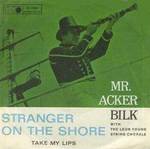
"Stranger on the Shore" is a piece for clarinet written by Acker Bilk for his young daughter and originally named "Jenny" after her. The tune was written on a single scrap of paper by Bilk and handed over to Leon Young (1916-1991) who crafted the string arrangement, including the characteristic harmonic shifts at the very end.
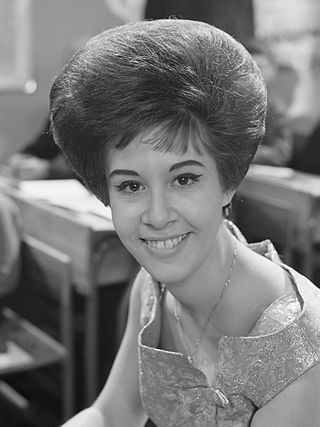
Helen Kate Shapiro is a British pop and jazz singer and actress. While still a teenager in the early 1960s, she was one of Britain's most successful female singers. With a voice described by AllMusic as possessing "the maturity and sensibilities of someone far beyond their teen years", Shapiro recorded two 1961 UK chart toppers, "You Don't Know" and "Walkin' Back to Happiness", when she was just 14 years old.
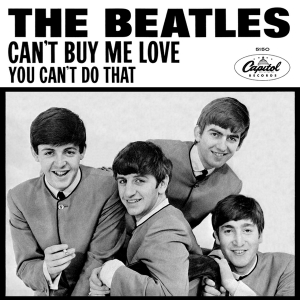
"Can't Buy Me Love" is a song by the English rock band the Beatles that was released in March 1964 as the A-side of their sixth single. It was written by Paul McCartney and credited to the Lennon–McCartney partnership. The song was included on the group's album A Hard Day's Night and was featured in a scene in Richard Lester's film of the same title. The single topped charts in the United Kingdom, the United States, Canada, Australia, Ireland, New Zealand, South Africa, the Netherlands, France and Sweden. In the UK, it was the fourth highest selling single of the 1960s.

"Come Together" is a song by the English rock band the Beatles, written by John Lennon and credited to Lennon–McCartney. The song is the opening track on their 1969 album Abbey Road and was also released as a single coupled with "Something". The song reached the top of the charts in the United States and Australia, but peaked at No. 4 in the United Kingdom.
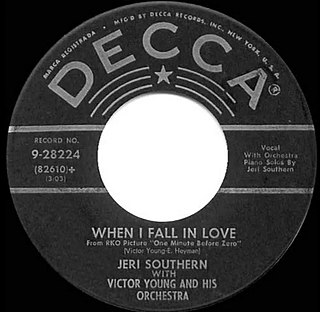
"When I Fall in Love" is a popular song, written by Victor Young (music) and Edward Heyman (lyrics). It was introduced in Howard Hughes' last film One Minute to Zero as the instrumental titled "Theme from One Minute to Zero". Jeri Southern sang on the first vocal recording released in April 1952 with the song's composer, Victor Young, handling the arranging and conducting duties. The song has become a standard, with many artists recording it; the first hit version was sung by Doris Day released in July 1952.

"Runaway" is a number-one Billboard Hot 100 song made famous by Del Shannon in 1961. It was written by Shannon and keyboardist Max Crook, and became a major international hit. It topped the Billboard charts for four consecutive weeks, and Billboard ranked it as the No. 5 song for 1961. It was No. 472 on the 2010 version of Rolling Stone's list of the 500 Greatest Songs of All Time and No. 466 on the 2004 version.

"Is This Love" is a song by British rock band Whitesnake. It was released in 1987 as the second single from their self-titled album.
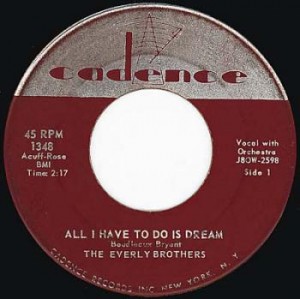
"All I Have to Do Is Dream" is a song made famous by the Everly Brothers, written by Boudleaux Bryant of the husband-and-wife songwriting team Felice and Boudleaux Bryant, and published in 1958. The song is ranked No. 141 on the Rolling Stone magazine's list of The 500 Greatest Songs of All Time. The song is in AABA form.

"The First Time Ever I Saw Your Face" is a 1957 folk song written by British political singer-songwriter Ewan MacColl for Peggy Seeger, who later became his wife. At the time, the couple were lovers, although MacColl was still married to his second wife, Jean Newlove. Seeger sang the song when the duo performed in folk clubs around Britain. During the 1960s, it was recorded by various folk singers and became a major international hit for Roberta Flack in 1972, winning Grammy Awards for Record of the Year and Song of the Year. Billboard ranked it as the number-one Hot 100 single of the year for 1972.

"Breaking Up Is Hard to Do" is a song recorded by Neil Sedaka, co-written by Sedaka and Howard Greenfield. Sedaka recorded this song twice, in 1962 and 1975, in two significantly different arrangements, and it is considered to be his signature song. Between 1970 and 1975, it was a top-40 hit three separate times for three separate artists: Lenny Welch, The Partridge Family and Sedaka's second version.

"You're My World" is a cover of Italian ballad originally recorded in 1963 as "Il mio mondo" by Umberto Bindi, who co-wrote the original version with Gino Paoli. Subsequently, an English version was commissioned, and the lyrics were written by Carl Sigman as "You're My World". The song reached No. 1 in Australia (twice), Belgium, Mexico, Netherlands, South Africa and United Kingdom in recordings by Cilla Black, Daryl Braithwaite, Guys 'n' Dolls and Helen Reddy. Black's and Reddy's versions reached the US Top 40 in 1964 and 1977, respectively. The song also reached No. 1 in France and Spain in the respective translations "Ce monde" and "Mi Mundo", both sung by Richard Anthony.

"Don't Give Up on Us" is a hit song recorded by American-British singer David Soul, and written by Tony Macaulay.

"Hey! Baby" is a song written by Margaret Cobb and Bruce Channel, first recorded at Clifford Herring Studios in Ft. Worth Tx, and recorded by Channel in 1961, first released on LeCam Records, a local Fort Worth, Texas label. After it hit, it was released on Smash Records for national distribution. Channel co-produced the song with Major Bill Smith and released it on Mercury Records' Smash label. It reached number 1 on the Billboard Hot 100 for three weeks, starting the week ending March 10, 1962.
"You Don't Know" is a 1961 single by Helen Shapiro. It was written by John Schroeder and Mike Hawker and released on the Columbia (EMI) label in the United Kingdom on 29 June 1961. "You Don't Know" topped the UK Singles Chart for three weeks beginning on 10 August. The single sold over a million copies and earned Shapiro a gold disc.

"Cupid" is a song by American singer Sam Cooke, released on May 16, 1961. It charted at number 17 on the Billboard Hot 100 and number 20 on the Hot R&B Sides chart; the track performed best in the United Kingdom, peaking at number seven on the UK Singles Chart. The song is featured on Cooke's greatest hits album, The Best of Sam Cooke (1962). Cooke's producers had asked him to write a song for a girl they had seen on a Perry Como TV show—but once they heard her sing, they kept "Cupid" for Cooke himself.
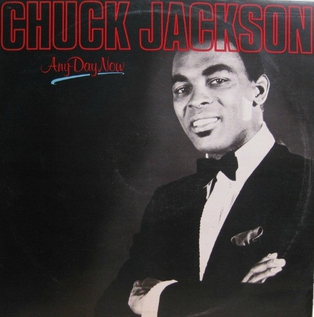
"Any Day Now" is a popular song written by Burt Bacharach and Bob Hilliard in 1962. It has been recorded by numerous artists over the years, including notable versions by Chuck Jackson in 1962, Alan Price in 1965, Elvis Presley in 1969, Scott Walker in 1973 and Ronnie Milsap in 1982. In the lyrics, the singer predicts the imminent demise of a romantic relationship and describes the sadness this will leave.

"It Might as Well Rain Until September" is a 1962 song originally written for Bobby Vee by Carole King and Gerry Goffin. King recorded the demo version of the song and it became a hit for her. However, Vee's management balked at releasing the song as a single, instead using it only as an album track. Bobby Vee recorded the song the same year for his 1963 Liberty album The Night Has a Thousand Eyes.

"When the Girl in Your Arms Is the Girl in Your Heart" is a 1961 hit by Cliff Richard written by the songwriting team of Sid Tepper and Roy Bennett who would contribute fifteen songs to the Cliff Richard canon including his career record "The Young Ones". Produced by Richard's regular producer Norrie Paramor, "When the Girl in Your Arms..." featured backing by the Norrie Paramor Orchestra. Richard's own group the Shadows backed him on the B-side "Got a Funny Feeling".

"The A Team" is the debut single by English singer Ed Sheeran. It was released as a digital download in the United Kingdom on 10 June 2011, serving as the lead single from his debut album, + (2011). "The A Team" is a folk ballad about a sex worker addicted to crack cocaine, a Class A drug. It was written after Sheeran visited a homeless shelter and heard some of the stories of the lives people had been living. He wrote the song following a last-minute performance at an event for the homeless. The chorus of "The A Team" was also used by Sheeran in the track "Little Lady", which features Mikill Pane. "Little Lady" is available on the EP No. 5 Collaborations Project.
"Don't Treat Me Like a Child" is the 1961 debut single of then fourteen-year-old Helen Shapiro, and was written by John Schroeder and Mike Hawker. The song was recorded at Abbey Road, with a nine piece band under the direction of Martin Slavin.
References
- ↑ Billboard Magazine, Hits of the World, November 1961. 6 November 1961. Retrieved 9 September 2012.
- ↑ Billboard Magazine, Hot 100, December 1961. 4 December 1961. Retrieved 9 September 2012.
- ↑ Dominic, Serene (2003). The ultimate Burt Bacharach For Fans. ISBN 9780825672804 . Retrieved 9 September 2012.
- ↑ Dowse, Tony (2011). The Ultimate Helen Shapiro. EMI Gold.
- ↑ Billboard Magazine, Hits of the World, December 1961. 18 December 1961. Retrieved 13 September 2012.
- ↑ Billboard Magazine, Hits of the World, November 1961. 20 November 1961. Retrieved 13 September 2012.
- ↑ Billboard Magazine, Hits of the World, December 1961. 4 December 1961. Retrieved 13 September 2012.
- ↑ Billboard Magazine, Hits of the World, March 1962. 10 March 1962. Retrieved 13 September 2012.
- ↑ Billboard Magazine, Hits of the World, February 1962. 20 November 1961. Retrieved 13 September 2012.
- ↑ "Platennieuws Top 10 – 1962". Platennieuws.
- ↑ Billboard Magazine, Hits of the World, April 1962. 14 April 1962. Retrieved 13 September 2012.
- ↑ Billboard Magazine, Hits of the World, February 1962. 10 February 1962. Retrieved 13 September 2012.
- ↑ Billboard Magazine, Hits of the World, January 1962. 4 December 1961. Retrieved 13 September 2012.
- ↑ Billboard Magazine, Hits of the World, February 1962. 3 February 1962. Retrieved 13 September 2012.
- ↑ "Marta Kubišová – S nebývalou ochotou (oficiální video)". Archived from the original on 15 December 2021. Retrieved 20 December 2020– via YouTube.